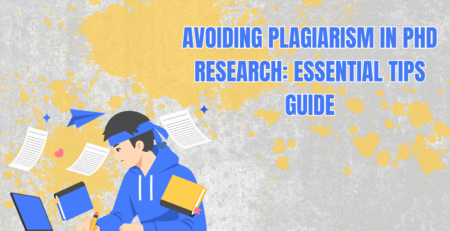How to Write a Thesis: A Step-by-Step Guide
Kenfra2024-07-29T14:05:20+05:30Learn how to write a thesis
our comprehensive step-by-step guide. Get answers to common questions and tips for crafting a successful thesis. Start your thesis writing journey now!
Integration of Related Literature
How Can One Effectively Integrate Diverse Literature into a Cohesive Thesis?
Integrating diverse literature into a cohesive thesis involves synthesizing different viewpoints and findings into a unified narrative. Start by identifying common themes, trends, and gaps in the literature. Organize your findings in a logical structure, often chronologically or thematically, and critically analyze the relationships between different studies. This approach ensures your thesis presents a comprehensive overview of the subject
What Strategies Help in Connecting Various Studies in a Meaningful Way?
Effective strategies include thematic grouping, critical analysis, and synthesis. Thematic grouping involves categorizing literature based on common topics. Critical analysis requires evaluating the strengths, weaknesses, and contributions of each study. Synthesis involves merging insights from multiple sources to construct a coherent argument or narrative. Using these strategies helps highlight how different studies complement or contradict each other, adding depth to your research.
Why Is Integrating Related Literature Crucial for a Comprehensive Thesis?
Integrating related literature is essential as it provides context and background for your research, demonstrating how your work fits within the existing body of knowledge. It highlights the relevance of your study, identifies gaps your research aims to fill, and showcases the progression of thought in your field. This comprehensive approach enhances the credibility and scholarly value of your thesis.
Theoretical Framework Preparation
What Steps Are Essential for Developing a Robust Theoretical Framework?
Developing a robust theoretical framework involves several key steps: identifying relevant theories, reviewing related literature, defining key concepts, and explaining how these concepts interact within the framework. Begin by selecting theories that align with your research question, then review the literature to understand how these theories have been applied. Define and clarify the key concepts and their relationships to guide your study.
How Does a Well-Defined Theoretical Framework Strengthen a Thesis?
A well-defined theoretical framework provides a structured lens through which your research can be viewed. It helps in forming hypotheses, guiding data collection and analysis, and interpreting results. This structured approach ensures consistency and clarity in your research, making it easier to understand and evaluate. A strong theoretical framework also demonstrates your understanding of existing theories and their application to your research.
Why Do Many Clients Struggle with Formulating a Theoretical Framework?
Clients often struggle with formulating a theoretical framework due to a lack of familiarity with relevant theories or difficulty in understanding how to apply them to their research. Additionally, synthesizing complex concepts into a coherent framework can be challenging. These difficulties highlight the importance of thorough literature reviews and a clear understanding of theoretical constructs in research.
General Knowledge of Research
What Are the Foundational Skills and Knowledge Required for Successful Research?
Successful research requires foundational skills such as critical thinking, analytical abilities, and proficiency in research methodologies. Knowledge of statistical analysis, data interpretation, and academic writing is also crucial. These skills enable researchers to design robust studies, analyze data accurately, and present findings effectively.
How Can One Enhance Their Understanding of Research Methodologies?
Enhancing understanding of research methodologies can be achieved through academic coursework, workshops, and practical experience. Reading methodological literature, engaging in peer discussions, and seeking mentorship from experienced researchers can also provide valuable insights. Continuous learning and practice are key to mastering research methodologies.
Why Is a Solid Grasp of Research Fundamentals Vital for Thesis Writing?
A solid grasp of research fundamentals is vital for thesis writing as it ensures the study is scientifically sound and credible. Understanding research principles enables you to design appropriate studies, choose suitable methodologies, and interpret results accurately. This foundation is crucial for producing high-quality, impactful research.
Citation and Referencing Practices
What Are the Best Practices for Accurate Citation and Referencing?
Best practices for accurate citation and referencing include understanding and consistently following the required citation style, keeping meticulous records of sources, and using citation management tools. Properly citing all sources of information, ideas, and data ensures academic integrity and helps avoid plagiarism.
How Do Improper Citation Practices Impact the Credibility of a Thesis?
Improper citation practices can severely impact the credibility of a thesis by undermining its academic integrity. Failure to accurately cite sources can lead to accusations of plagiarism, which can damage your reputation and the validity of your research. Proper citations show respect for original authors and contribute to the scholarly conversation.
Why Do Clients Often Face Challenges in Maintaining Consistent Referencing?
Clients often face challenges in maintaining consistent referencing due to a lack of familiarity with citation styles, insufficient attention to detail, or the complexity of managing multiple sources. Utilizing citation management tools and thoroughly proofreading references can help overcome these challenges.
Methodology Selection
What Factors Should Be Considered When Selecting an Appropriate Research Methodology?
When selecting an appropriate research methodology, consider factors such as the research question, objectives, nature of the data, and available resources. The chosen methodology should align with the study’s aims and provide the most suitable approach for collecting and analyzing data. Evaluating the strengths and limitations of different methodologies is also crucial.
How Does the Chosen Methodology Influence the Outcomes of a Thesis?
The chosen methodology directly influences the validity, reliability, and generalizability of the research outcomes. An appropriate methodology ensures that the data collected is relevant and accurately analyzed, leading to credible and meaningful results. Conversely, a poorly chosen methodology can compromise the study’s findings and overall quality.
Why Is It Challenging for Clients to Determine the Most Suitable Methodology?
Determining the most suitable methodology can be challenging due to the vast array of available options and the specific requirements of each research project. Clients may struggle with understanding the technical aspects of methodologies or aligning them with their research objectives. Guidance from experienced researchers and methodological training can help address these challenges.
Use of Academic Language
What Defines Effective Use of Academic Language in Thesis Writing?
Effective use of academic language in thesis writing is defined by clarity, precision, formality, and coherence. Academic language should be free of jargon, ambiguous terms, and colloquialisms. It should clearly convey complex ideas, present arguments logically, and adhere to the conventions of academic writing in your discipline.
How Does the Use of Appropriate Language Enhance the Clarity of Research Findings?
The use of appropriate academic language enhances the clarity of research findings by ensuring that ideas are communicated clearly and unambiguously. Precise language helps avoid misunderstandings, allows for accurate interpretation of data, and strengthens the persuasiveness of your arguments. Clear communication is essential for conveying the significance and implications of your research.
Why Do Clients Struggle with Adopting Academic Language Conventions?
Clients often struggle with adopting academic language conventions due to unfamiliarity with formal writing styles, lack of practice, or difficulty in articulating complex ideas succinctly. Reading academic papers, practicing writing regularly, and seeking feedback can help improve proficiency in academic language. Academic writing courses and resources can also provide valuable guidance.
By addressing these common challenges and providing strategies to overcome them, Kenfra Research aims to assist clients in producing high-quality, impactful thesis and research papers.










Leave a Reply